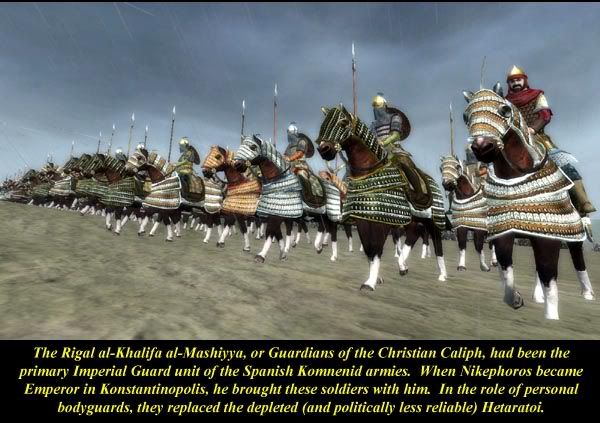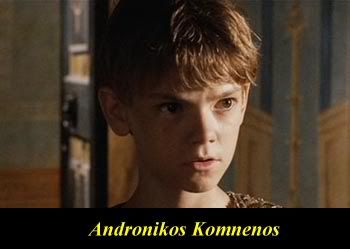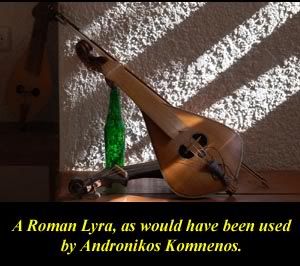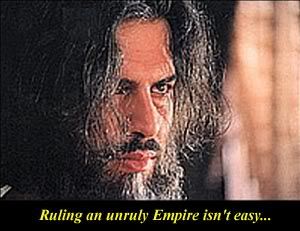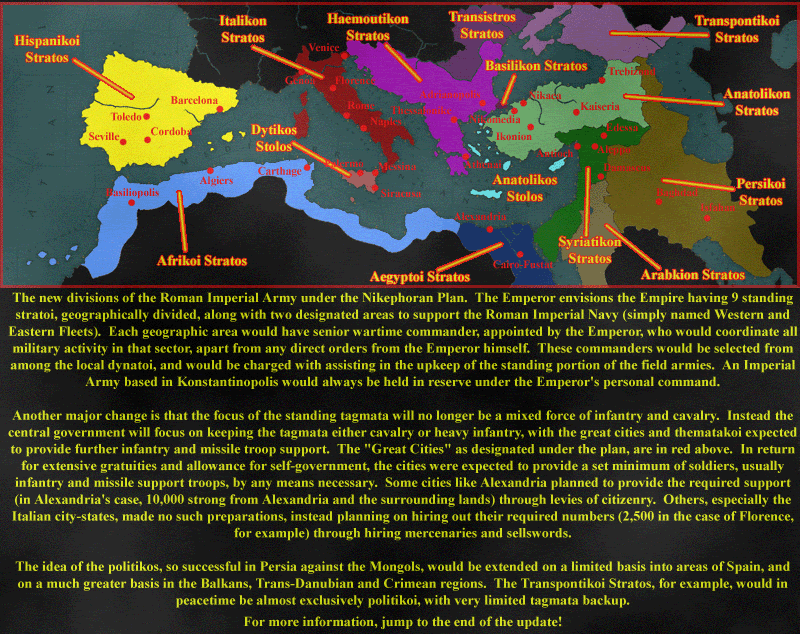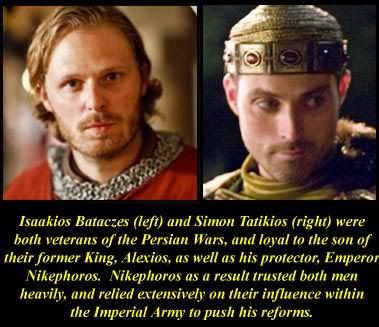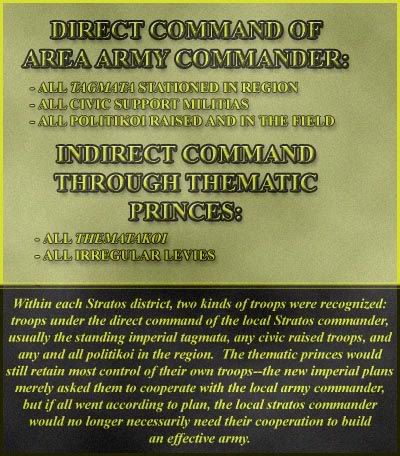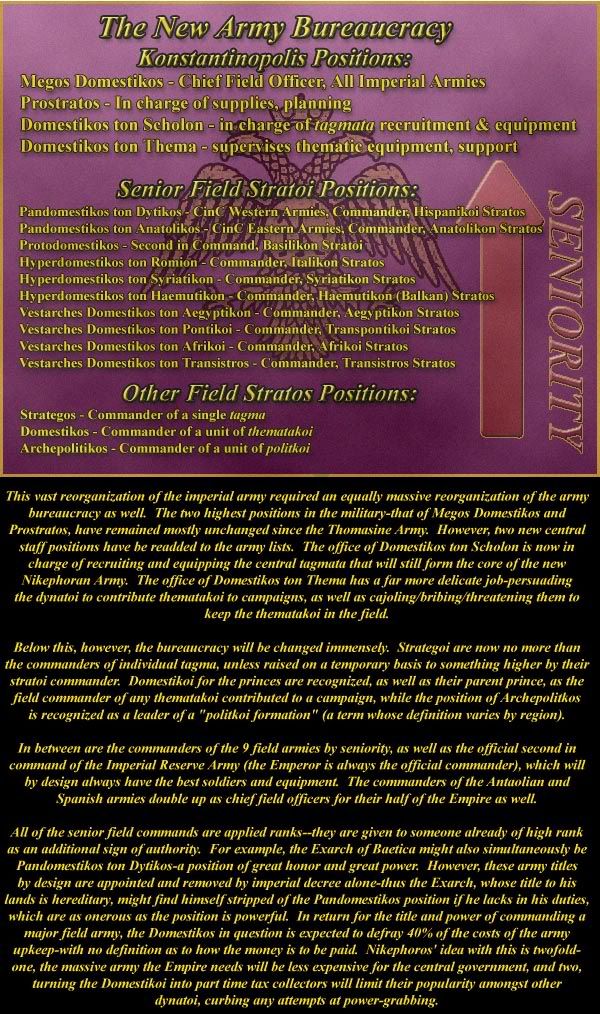AlexanderPrimus - Indeed, after the death of OTL Andronikos Komnenos, there was a scramble amongst the nobility related by marriage to the imperial family to claim the right to rule (the Angelids were technically a cadet branch, or related to a cadet branch of the Komnenoi, IIRC. I know the Paleologics and Laskarids were). Megos Komnenos was the official surname of the ruling dynasty in Trebizond till its end, in fact.
FlyingDutchie - True, but also one, the Habsburgs, Romanovs and Bourbons weren't ruling a Roman Empire, and second, while those families accomplished great things, none of them arguably restored the Roman Empire itself territorially. These two things put together would set the Komnenoi apart... enough that probably, they could create a title like
Megas Komnenos.
c0d5579 - Second (and primary) reason I chose
Megas Komnenos was that simply by this point, the vast majority of the ruling and powerful
dynatoi in the empire can, through marriage if not outright blood, claim relation to the family. The title is also intended to be a reflection of the Emperor's paramount position within the "Family of the Purple" as it is a synonym for the Imperial title itself.
Hawkeye1489 - Its the Byzantines we're talking about. New and fancy titles are bound to happen. At least no one has thrown out
Kosmokrator (Lord of All Time) yet!
RGB - Of course! You have to have shiny new baubles to bribe/cajol people with!
Enewald - The lords of Arabia are
Rigas in this system (a mistake I corrected, since your posting), while the Sultan of the Turks as of yet lies outside of the system. Likely his position would be equated with that of a
Rigas--high, but clearly subservient to the
Autokrators in Persia. As for the Komnenoi count at this point... its well above 2000 the game is tracking. That's not counting minor nobility that CK routinely lets die off due to sitting around and not marrying (which I take to be that branch of the family marries off too low to be of county notice, and keeps on being minor barons or less).
Laur -There have been multiple emperors on repeated occasions in history, and in this AAR, though not usually in peacetime. Basil left us a triple monarchy that briefly became a quadruple monarchy when Leo claimed the purple in Italy. Unlike those times, however, there is clearly one paramount emperor (Nikephoros), to which all others are either clients (Gabriel's boys), or puppets (Thomas). As long as there is a clear top dog, there's no reason for the system to keep going as is...
Servius Magnus - Both Arabia and Persia could clearly be considered client states, Arabia moreso than Persia. Both are technically independent, but in practice would defer to Konstantinopolis and rely on its literally endless supply of manpower for support.
von Sachsen - There was a day when being a
Komes was relevant and important--Nikolaios Komnenos leapt from being a
Komes to an Emperor almost. Those days are LOOONG gone...
Without further ado, the next update! Graphic heavy, but well worth it!
“Le monde entier n'est qu'une scène, et tous les hommes et les femmes n'en sont que des acteurs: ils ont leurs sorties et leurs entrées…”
- Guillaume Shakespearé
August 5th, 1255
Anastasia von Franken nee Komnenos looked back at the guardsmen standing resolutely at either side of the doors to the famous Octagon. The ancient throneroom positively
smelled of its past—while its marble and porphyry had been continually swept and kept clean, above the banners of the ancient and illustrious—Demetrios
Megas, Manuel Komnenos, even the
Megaloprepis, drooped overhead, lending the air a slightly musty odor.
But she cared not. The members of the
Rigal al-Khalifa al-Mashyyia were the only units she trusted to guard herself and her son in the Queen of Cities. They were Moors to a man, some converted, others not, but they were a visual reminder of the land she called
home in this sea of pompous arrogance. She turned around, and beamed at her reason for being here.
Her son Andronikos beamed back at his mother.
He was small for eight years, his frame and hands more delicate than that of the other eight year olds that ran through the halls of the ancient Great Palace. Yet despite his smaller size, Andronikos was a great talker—he had many friends amongst the other children of the elite, and rarely ran afoul of the other children. There were moments—Anastasia remembered when the headmaster of the school,
Metropolitan Rinaldo dei Conti di Jenne, had seen another boy, a new child named Ioannis Angelos, son of the Prince of Ikonion, challenge the smaller boy to a wrestling match. Di Jenne had scrambled down the stairs from his balcony perch as quickly as he could, only to find the boys already rolling on the ground. Little Andronikos was pinned by the bigger boy, but refused to give up or tell the other child who he
really was.
At the thought of the priest’s ashen face, she smiled slightly. In an irony of ironies, Angelso and Andronikos had quickly become friends thereafter.
“Another, mama?”
Anastasia nodded, and her son grinned broadly, before bringing the lyra close to him and properly setting its bowstring with the same severity as a priest administering Last Rites. He was play publicly before the whole court in three weeks, and the boy had been pestering his mother to watch him and grade the performance. Anastasia had after her father’s insistence been trained in music—even if the
lyra wasn’t her area of expertise, her musical ear had grown used to the eastern instrument. Andronikos’ lyra had been especially made for him, and he loved the thing dearly. Yet as she nodded, she looked into her sons eyes, and saw that same thing that had puzzled her since around when he turned four.
His brown eyes were bigger than those of other kids his age, which should have meant the warmth and kindess of his actions should have shone through like a beacon in the darkest night. Yet sometimes she looked into his eyes, she
couldn’t see any further. It was like there was a mask somewhere back there, shielding his mind. It was usually only momentary, a quick flash before it was gone. She wasn’t sure what it was—she’d always ascribed it to influence of Albrecht on the boy.
Andronikos sat down once more, his young face stern as he focused on the
lyra and his bowstring. For a few seconds, silence deafened the room, until the beautiful, rapid notes of
The Italian Juggler filled the air. Anastasia closed her eyes—ah, this was how the music was supposed to sound…
…then she suddenly frowned.
It was only a slight mistake that he’d made—a note held a fraction too long that disturbed the rhythmic pulse of the ballad for no more than a moment—but one that Anastasia’s ears acutely picked up. Despite the glitch, Andronikos gamely played on, as if nothing had happened. An amateur would have let that slight stumble crush his will and the whole song, screeching to a halt to immediately practice that stanza, and even a more seasoned performer might have lost rhythm just long enough for the audience to hear, but Andronikos covered his mistake well. Anastasia had no doubt her boy would spend twenty or thirty minutes after they were gone hammering that part again and again until he got it right, but for now, in public, he looked cool and calm, as if nothing had happened.
Such calm could be useful in politics as well—and calm was something the Imperial family had decidedly
lacked during its century and a half in power. Her face darkened for a moment as she remembered her ‘husband’s’ sneering at Andie’s work, but in her eyes, being Emperor, holding court, and commanding the lives of millions was more than a simple exercise in power. It was a performance, on the greatest stage of all…
“His Imperial Majesty!”
Anastasia had been so lost in the music she’d almost forgotten he chamberlain and guards were present at the far end of the hall behind them—so his deep, rumbling announcement almost made her jump out of her skin. By the time she turned around, the great doors had already opened, her brother gliding through.
Time in the Throne of Caesars had not been kind to Nikephoros—his raven black hair had prominent strands of gray lurking in its shadows. He still had the brisk walk she remembered from his days in Spain, but the spring in his step, the light in his eyes—Konstantinopolis has stolen them. Instead of light and music, his days were filled with meetings, plots, and disagreement. It’d aged him more than his scant 33 years.
“Sister!” he smiled, thin but warm, as he came up, arms spread. She rose and held him close.
“You made it!” she squeaked. “You’d said you had meetings all day with the
strategoi and your cousin!”
“Ach, Thomas!” Nikephoros sighed, gesturing her towards her chair. She sat down, then looked up at him expectantly. A few moments later, she looked down momentarily—he was too busy pacing to sit next to her, let alone pay attention to the wondrous music his nephew was creating in front of them.
“The idiot!” Nikephoros hissed to no one in particular. “You wouldn’t believe what Thomas proposed!”
“What now?” Anastasia asked, resisting the urge to shiver as the notes of the lyra became haunting. She’s already planned to show Andronikos the
guitar, a musical instrument from her homeland of Spain, but she knew in her heart the Roman
lyra would always be his first love.
“He wants to tear down the
Hagia Sophia and build another Kosmodion monstrosity!” Nikephoros threw up his hands in disgust, turning in place to resume pacing in the opposite direction. “Can you believe that!? Tear down the
Hagia Sophia!”
“You naturally said there wasn’t enough money after the Kosmodion?” Anastasia asked absently. Oh, she loved this part of the song!
“Yes, and like normal, he pressed, ignoring the looks of pale confusion from everyone present! I swear, Anastasia,” the
Megas Komnenos hissed, “if Albrecht didn’t keep reminding me that Thomas reminds everyone of the alternative to my rule, I’d have him tonsured and sent to a monastery! God help us all if he actually got power! There’d sure be no army reform!” the Emperor complained.
Anastasia frowned, as
this topic came up again—the topic that had literally been dominating her brother’s entire
life for the past five years. Not a day went by without some meeting, some contentious argument, some
dynatos or
strategos or whomever else yanking her brother’s ear wanting to have a moment of the Emperor’s time to say how they hated his plans and wanted it changed! The army was the reason she now thought she saw gray in his 33 year old hair, and wrinkles by his eyes!
Part of her understood why he worked so hard, so diligently at reforming the military—it was a high stakes game. For the moment, Nikephoros the Spaniard was beloved by the people, and tolerated by the Church and the
dynatoi as the only possible safe Emperor. The longer time went on, the less that “safety” would seem a pressing need to have an Emperor who wanted to change everything—Nikephoros’ window to act was short.So, while he
had the Church, and while he
had the
dynatoi, Nikephoros was resolved to change the Roman army, that wing of the state that had for so long denied his family their rightful place. With the retirement of most of the non-
dynatoi strategoi after the continual strain of Persia, as well as the mustering out of many veterans, the army itself was in a rather homely condition—Nikephoros’ own Spanish troops were crack and in top shape, as were the imperial
tagmata who had sat out the Eternal War outside of Persia, but the crack units, the units that had spent fifteen years under Gabriel’s command in one way or another, were shells of themselves. Politically it’d given Nikephoros his chance. Militarily, it was something that needed rectifying.
Previously, the army had consisted of standing
tagmata stationed around the Empire that were called up on an ad hoc basis when the Emperor desired to campaign. These
tagmata were backed by
thematakoi of varying quality. The system, while vast and powerful on paper, couldn’t coordinate to meet multiple threats at once—it’d only been through luck that when the Mongols had struck, the Germans and French were too busy with their internal squabbles to make any threat on Roman interests. The central army was also expensive—the
tagmata have ballooned under Thomas I and II, peaking at nearly 180,000 under arms in 1215. The force was simply too small to defend all of Romanion, but too expensive for the Emperor alone to maintain.
Nikephoros was resolved to change that—firstly to protect the Empire that was now his, but more importantly, to neuter the army as a source of political power in Konstantinopolis. With a system geared around
tagmata being called for one campaign under one commander, it gave the soldiers a chance to become loyal to that one commander, and then shove him into the purple. It’d happened countless times—most recently with Thomas I Komnenos. Nikephoros was determined that it would not happen again, even if in the eyes of many common soldiers Gabriel Komnenos was the Hero of Persia, and not a religiously and sexually misguided fool.
That was the true reason for Nikephoros’ urgency in reforming the army. It was only a matter of time before the Lion broke from his cage, gilded as it may be. Even Anastasia saw that. Maybe it would happen through sheer force of personality, maybe through brute strength, but Gabriel Komnenos would not be cowed by his two sons who were only more frightened of Konstantinopolis than their father. When he finally was free, Nikephoros wanted his distant cousin to find an army that was alien to him—new commanders, new organizations, all of whom were loyal to Nikephoros,
not Gabriel!
It still didn’t stop Anastasia from worrying about him, and how the constant debate as he shoved forward his reforms wore on him.
“More
strategoi complaining?” Anastasia asked, trying to focus on her son’s music. She was failing. “They don’t like the idea of the commander of the
Basilikon Stratos being lower ranked than the
Sebastokratoi?”
“In a word, no,” her brother growled in understatement. “The remaining
strategoi are
not happy,” Nikephoros gave a tired smile, “but eh? When are they?” He gave a huff, unregally plopping down next to her. “With
Despotes Angelos on board, they really didn’t have much choice when every single great lord in the Empire voiced their assent.” Anastasia hoped to see her brother grin at that triumph, but instead, Nikephoros’ face darkened. “They’re going to find other ways to protest, especially when I unveil the other new ideas I have for the
domestikoi and the
stratoi…”
Anastasia closed her eyes, fighting the urge to say something even as her brother’s worried tones slowly swallowed the beauty of her son’s music.
“Ha! Even the
dynatoi will holler a bit when they find out becoming a
Hyperdomestikos or
Vestarches means they’ll have to pay for 40% of the
stratoi upkeep!” He sighed, the noise wiping out the opening verses of
Jimensesios on the the Prowl. “Once I explain that I don’t care where the money comes from, they’ll get creative. And we’ll suddenly having less
dynatoi in the
themes dodging taxes, and hopefully, maybe, the taxman, not
me, will get blamed…”
Anastasia opened her eyes slowly, her mind not wanting to let go of the beautiful music that hung in the air like a sweet perfume. When her eyes laid on her brother, she gave a disapproving, motherly scowl. “Listen, Nikky,” she said, a smile of pride breaking through.
Nikephoros blinked, then looked over at his nephew. Andronikos had already switched his hold, and the faster pace of
Jimenesios on the Prowl echoed through the air. Anastasia watched her brother’s fingers twitch slightly, before Nikephoros, like everyone else that had heard the eight year old’s rendition, began to tap his fingers against his leg.
“Wonderful,” the Emperor muttered, his voice distant. Anastasia beamed—her brother used to love music, and even during the most hectic day in Spain there would be time for a troubadour, a Frankish ballad, a Castilian dance, a Moorish dirge. But here, the gold and glitter of the City of Cities needed a constant hand, and a constant mind. Rarely did Nikephoros a respite from the rigors of reforming a bloated, antiquated bureaucracy. Anastasia was even happier her son provided it.
“I think the future Emperor should learn more than just politics and swordplay,” Anastasia said with more than a hint of pride. Her husband of three years had daily taken time from his busy day to tutor the boy since he turned six. As the final notes of the song danced on the wind, she knew if she stopped him and asked who the King of France was, little Andie would know. Maybe not the King of Scotland, or the King of the Swedes, but he was only eight. There would be time to learn those things.
The performance, though, was now.
She glanced up at her brother. The Emperor shook his head slowly, as if unwillingly banishing a dream from his mind. “Maybe I should adopt another heir, and make Andronikos the court musician?” he muttered with a smile. “Is that what you wanted me here for?” he added.
“Ha!” Anastasia snorted, completely unlady-like. “No! No, no… Theophano and I have been talking and…”
Nikephoros sighed, looking away. Anastasia frowned. Fine. If he was going to be this way, she was going to cut straight to her point.
“You’re overworking yourself!” Anastasia complained. “I can see it in your eyes…”
Nikephoros looked back at his sister, and rolled his eyes slightly.
“…and in your surliness!” she added with a glare. “When was the last time you went hunting, like you used to? Or took a trip on the Marmara? You need
rest, Nikky, you need some time to yourself! Away from von Franken, Angelos, and all those
strategoi!” she waved her hand dismissively.
“Anastasia, I’m making, literally, a
horde of new positions!” Nikephoros complained weakly. “Completely rearranging how the army is organized, completely…” his protests died to a murmur when she put a finger over his lips. For a moment, brother and sister were alone with the music, till suddenly Nikephoros’ eyebrow quirked upwards, and a smile crossed his lips. “Theophano put you up to this, eh?”
“Yes,” Anastasia grinned in triumph. “Your wife knows sometimes only your sister can get through that bullheaded skull of yours!”
“Fine,” Nikephoros sighed and smiled. “Fine! We’ll take a hunting trip the day after tomorrow! Bring Andronikos, I’ll bring Lord Angelos and Diasorenos and…”
“Keep it small?” Anastasia advised.
“…ah.” The Emperor voice skidded to a halt. “I’ll keep it small. Only
strategoi allowed will be Bataczes and Tatikios.”
“No state talk?”
“I promise!” Nikephoros held up his hand in a fake oath as the last seconds of Andronikos’ song hung in the air. Both turned to the young boy, who was beaming from ear to ear.
“Uncle Nikky! Did you like it?” he eagerly asked, running towards them.
“Loved it!” the Emperor laughed, grabbing his nephew and hoisting him skyward.
As uncle and nephew laughed, Anastasia wished the moment would last forever. A small, dark part of her heart cried that it wouldn’t—the business of the state always hung over the Komnenoi, like a dark, persistent shadow that would never leave…
==========*==========
More information on Nikephoros’ reforms. I thought pretty graphics would be a more pleasing way to convey things than a simple mass of text!




